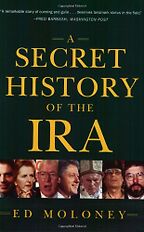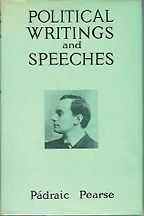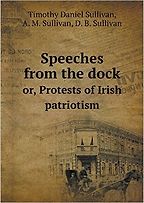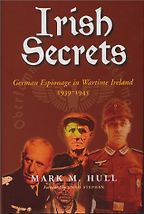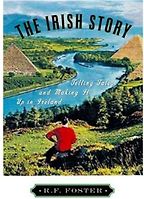Tell me about your first book, A Secret History of the IRA by Ed Moloney.
Ed Moloney was the political editor of The Irish Times for many years. He is an acknowledged expert on the IRA, politically, militarily and – which was of enormous interest to me – philosophically and morally. He has, I believe, unique insight into the particular psychology of Gerry Adams and traces his development from his earliest years to his current position of political power and acceptance, one which was unimaginable a decade ago. He is also fascinating on the careful separation in the specific use of language between the political and military wings of the IRA and the moral implications of that separation. Language used and abused.
In this book he analyses, at great cost to himself, the way in which, through the exploitation of the narrative of Ireland, the IRA sank into barbarism. The barbarism and cruelty of the ‘other side’ was equally appalling. The historic injustice endemic in the running of Northern Ireland was a disgrace – however, nothing excuses the depths to which they descended. Most shocking was the ruthless bombing of civilians, as often with sheer political calculation atrocity was piled on atrocity. This book demonstrates that many of these tragic events were not as disorganised as we might have imagined. They were not the result of the tragic miscalculations of madmen but deliberate attempts at any cost to break any moves towards peace.
“Truth and Reconciliation is an admirable aim – but only if there is Truth.”
Finally, and in the current supposedly more benign society in Northern Ireland, a definition of power still lies within that circle of terror which they created. Indeed, there is no more telling definition of subtle terrorism than the story of the McCartney sisters, who, when they were looking for information about who killed their brother Robert, were met with a wall of silence – a Gaelic version of omerta. The sisters went to the Pope, they went to President Clinton and Tony Blair and they never got what they wanted. Yet there were 70 people in the public house when he was taken out and murdered. So, if you want to know what naked fear is even after the peace process in Northern Ireland, look at how extraordinary it is that nobody was prepared to come forward. I refer to this incident in my novel even though it is horrible, because any society should be deeply disturbed by such a failure of justice. I truly admire Ed Moloney’s book – and, of course, found it to be enormously helpful while I was writing The Truth About Love.
How has this book influenced your writing?
Well, I think it helped clarify my own feelings about the dangers of absolution and made me more certain that it encourages terrorism. When Gerry Adams and Martin McGuinness were negotiating for peace in Northern Ireland with Tony Blair, they demanded that all terrorists be let out of prison. This concession was granted to both sides. Some of these men had only been in jail for a couple of years for carrying out unspeakable crimes. But they were all let out. What does that say to you as a terrorist? That all peace negotiations give you this amnesty? I feel that we taught the world a terrible lesson. We were all desperate, of course, for peace but the negotiators should have said no. Ed Moloney’s book implies the peace negotiations would have continued.
Frankly, if you are prepared to blow up innocent women and children because you think your cause is good, you should be prepared to face the consequences and serve your time. Yet these men and women are walking up and down small towns in Ireland getting on with their lives. It must be agony for the families of the victims to watch them. Truth and Reconciliation is an admirable aim – but only if there is Truth. And it is in very short supply in Northern Ireland. Behind all of this my belief is that you need to look at the philosophical and spiritual dimension of what makes people perpetrate acts of violence. If you do not understand that you will never stop the acts of violence. I believe strongly that love of country when twisted breeds tragedy in the same way that human love when twisted does. All love has a moral dimension. We forget that at our peril.
Your next book is Political Writings and Speeches by Patrick Pearse.
He has long been a hero of mine. He was one of the greatest orators of his time, a teacher who spoke many languages and bravely led the 1916 Easter rebellion of which Yeats wrote ‘A terrible beauty is born’. Both he and his brother were executed later. When I was young I was in a way in love with his story and deeply moved by his fate. His speech at the grave of O’Donovan Rossa is quoted as one of the greatest rallying cries in history. O’Donovan Rossa was a founding member of the Irish Republican Brotherhood, popularly known as the Fenians. He died in New York aged 84 and his body was brought back for burial in Ireland. Patrick Pearse made the graveside oration. There is this wonderful ringing line:
‘They think that they have pacified Ireland. They think that they have purchased half of us and intimidated the other half. They think that they have foreseen everything, think that they have provided against everything; but the fools, the fools, the fools! – they have left us our Fenian dead, and while Ireland holds these graves, Ireland unfree shall never be at peace.’
Much of Pearse’s political writing is a spiritual and moral call to arms. In this book, which contains many wonderful speeches, the theme of chivalry is crucial – Irish boys are seen as knights, ‘strong of limb, true and pure in tongue and heart’. One of his most devastating lines – in my opinion in literature – is: ‘There is only one way to appease a ghost, you must do the thing it asks for.’ That is an astonishing line. In my book I compare this task to that of Hamlet, the power of ghosts. Until you understand that aspect of the Irish narrative you won’t fully understand Ireland. The power of the past and of a heroic legacy has dangerous aspects. As I said about Ed’s book, we must be careful in our exploitation of the romantic dream of patriotism
Your next book is difficult to find but, according to you, well worth it – Speeches from the Dock or Protests of Irish Patriotism by A M Sullivan.
Yes, I couldn’t believe my luck when I came across it – I had often heard my mother talking about it. And it really is astonishing. One of the characters in my book says, ‘Only in Ireland could Speeches from the Dock become a bestseller.’
And it was indeed a huge bestseller. This again is going back to men like Patrick Pearse who were hanged or shot for their commitment. Many of them were Anglo-Irish and some of them Anglo-French. National narrative can sometimes be driven by mythological and literary figures. Think of Shakespeare’s non-historical characters like King Lear or Hamlet that play deeply into the subconscious of the British. In Ireland we have, of course, figures from literature – Bloom, Juno, Christy Mahon – and Dublin has produced more Nobel prizes than any city in the world. However, historic and tragic figures like Wolf Tone or Robert Emmet are even more powerful. From the time I was five I could recite lines from Emmet’s last speech. And every single child in my class knew these lines:
‘Let no man write my epitaph: for as no man who knows my motives dare now vindicate them. Let not prejudice or ignorance asperse them. Let them and me repose in obscurity and peace, and my tomb remain uninscribed, until other times, and other men, can do justice to my character; when my country takes her place among the nations of the earth, then, and not till then, let my epitaph be written. I have done.’
It is almost Keatsian. And, of course, his epitaph hasn’t been written because we are still not a united country.
Your fourth book sheds light on Germany’s influence in Ireland. This is Mark M Hull’s Irish Secrets: German Espionage in Wartime Ireland.
This book is really fascinating. It came out not that long ago. There has always been knowledge that Hitler did send over people to Ireland because its geography (and geography, as someone once said, is history) was strategically so important to Germany. Also, even going back to 1916, money and help for Ireland from Germany was crucial. In the late 30s the IRA of the time was pro-Hitler, not because they were that interested in Nazi ideology but because ‘my enemy’s enemy is my friend’. This book tells the story of what happened to those who were sent over from Germany. It explains how and why they failed. De Valera was incredibly manipulative and a seriously clever man. He elected to follow the path of neutrality, but, as some wit wrote, we were ‘not neutral on the side of Hitler’.
Get the weekly Five Books newsletter
Though disturbing, many of the stories in this book are actually hilarious. For example, efforts to set up an Irish radio station for Germans. Another story concerns a Christmas celebration in 1937. Under decorations of Swastika flags and Irish Tricolours and the watchful eyes of the Fuhrer’s portrait there was an Irish/German gathering at a hotel in Dublin. At one point they all rose to salute the Fuhrer and sing ‘Deutschland über Alles’. This was followed by a rendering of ‘The Soldier’s Song’ – our national anthem. The mind boggles. Of course, neutrality protected us from bombing and also encouraged a certain ambivalence. I think post-war we found it very difficult to accept the truth until the Eichmann trials in 1960s when there was irrefutable evidence of the reality of the Holocaust.
Your final book is Roy Foster’s The Irish Story: Telling Tales and Making It Up in Ireland which is, of course, all about narrative.
Yes, Roy Foster is a remarkable writer. His biography of Yeats is a magisterial masterpiece. Yeats who put Irish mythology firmly in the people’s psyches. And yet bizarrely, as Roy points out, Yeats also produced and directed the Abbey plays by Sean O’Casey, the great myth-destroyer, and Synge. Dubliners hated those plays – there were riots – because we never wanted that heroic mythology destroyed.
In The Irish Story Foster examines the ways in which narrative becomes an agent for the making of history. We are old friends who have talked about this endlessly. I was very much the junior partner in these conversations – Roy is a Professor of History at Oxford! I found this book enormously helpful in writing The Truth About Love because I believe that in private human life – as well as in the historic life – we tell ourselves the story of our own lives and the lives of the people we love through that narrative. The Irish Story connected with what I was trying to do with my book – trying to show philosophically the power of the historical narrative. You can do three things with memory: exploit it, live with it, or you can try and destroy it. And, in a sense, it is my philosophy and I think Roy feels the same that we the Irish have exploited it brilliantly.
Foreigners will always associate Ireland with a kind of victimhood, and of course we suffered, but we were not the victims in two world wars. So, in a sense, the permanent narrative of victimhood is not quite accurate.
So it is the whole idea of selective memory?
Exactly. As I said, yes, you can exploit memory, live with it, or obliterate it. France, for example, after their terrible suffering in the First World, was to find they couldn’t bear the idea of what they did later on in the Second World War. For decades they obliterated it .They are only now in the past few years coming to terms with it. In Germany you can go to prison for five years for denying the Holocaust. Germany must live with its shocking past. So for me the whole idea of the exploitation of historical and personal narrative – often co-mingled – really is fascinating. Are we telling the true story? Ever?
May 29, 2010. Updated: June 19, 2020
Five Books aims to keep its book recommendations and interviews up to date. If you are the interviewee and would like to update your choice of books (or even just what you say about them) please email us at [email protected]
Five Books interviews are expensive to produce. If you've enjoyed this interview, please support us by donating a small amount.
